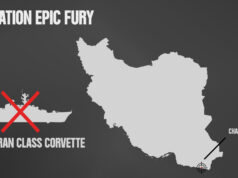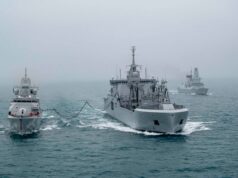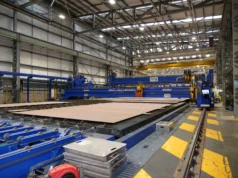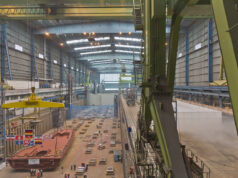Reacting to the halting of the international competition for the Fleet Solid Support order, union GMB has called for the ships to built in UK yards.Â
Speaking at the union’s manufacturing conference in Belfast today, GMB General Secretary Tim Roache said that the Government should now go further and guarantee that all future orders for military vessels should be placed in the UK.
Competing for the work was a British consortium consisting of companies Babcock, BAE Systems, Cammell Laird and Rolls-Royce (forming Team UK) and international bidders Fincantieri (Italy), Navantia (Spain), Japan Marine United Corporation, and Daewoo Shipbuilding and Marine Engineering (South Korea).
Fincantieri and Daewoo Shipbuilding and Marine Engineering had already withdrawn, according to the Financial Times. This left only Team UK, Navantia and Japan Marine United Corporation.
On Tuesday the Ministry of Defence published a critical report by Sir John Parker which said that the policy putting all shipbuilding orders apart from frigates, destroyers and carriers out to international tender is not ‘the right strategic approach’ and that ‘UK-only competition should be considered for future defence-funded vessels.’
Tim Roache, GMB General Secretary, speaking at the union’s manufacturing conference, said:
“This is an important victory but we are not celebrating yet. We will continue to keep up the pressure until these ships are being built in our yards, by GMB members, using British steel.
The Government must now fundamentally change its approach and announce that it will keep this order and all military shipbuilding orders in the UK.”
The shipbuilding unions have long campaigned for the practice of sending orders overseas to be ended, as have we.














i think all our naval ships capital or not should be built in the UK,so long as the ship builders don,t get greedy.Because i think we could have had the 2 extra type 45 if BAE had not been so greedy,as they have the monopoly which should never been allowed in the first place..
I completely agree. Whilst we must ensure that British taxpayers money goes to benefit the British economy, we must also make sure that we are getting value for money. So all British shipyards must be encouraged to bid for all naval contracts. Also why can’t we go back to the days when one class of warships was built by several different yards, rather than just one as today?
Because that only worked with a massive fleet, Steve. It’s good at producing quantity, but it’s not very cost efficient because you’re paying to have 3 sets of workers learn the same skills and lessons instead of just one.
In the age of the relatively small peacetime navy, having a few yards that specialise in different types of construction is more cost effective. This unfortunately results in monopolies, but as long as the terms of the contract put the cost of any issues on the yards and not the government (which is largely where we went wrong with the T45 for example), in theory the incentive to be cost competitive should remain even though there’s no competition
There are virtually NO shipyards left
Scotstoun is building T26
Barrow is fully occupied building subs
Roysyth isnt a proper shipyard
Portsmouth closed years ago
Appledore closed 6 months ago
Camlelairds might get T30 with BAE assistance
Ferguson’s TOO small
Bollox. The wasting of Type 45 money was entirely due to one Gordon Brown. Zippo to do with Bae.
I’d have to disagree there, most of the reports I’ve read put the vast majority of the blame on the MOD. Poorly developed requirements, unrealistic expectations, bad contract structure and poor management. There was surely a change in strategic direction over that time (more focus on conflicts similar to Afghanistan, rather than what we’d need from a T45), but that was the general thinking of all major NATO countries at the time, and can’t really be put at Gordon’s feet either.
The Labour government of the time did cut £1Bn from defence during the time of the project, but that was from the budget overall, not T45 specifically, and the project was already over budget by then.
This paper from the US Naval War College is a pretty good summary, hopefully it can be considered a non-partisan and reliabel source: http://digital-commons.usnwc.edu/cgi/viewcontent.cgi?article=1393&context=nwc-review
That’s a telling link there Joe, it seems (as is the way of things) the MOD has knee jerked the opposite way with the 31’s and tried to nail everything down first. Maybe lessons have been learned although I’m sure industry pay a lot of clever people a lot of money to find loopholes in things…. still, at least they’re not falling over themselves to hand money over to BAE et al.
I agree with Andy. Plus we shouldn’t have all our major naval programs dependant on Scottish yards both in case of Scottish independance & to share the buisness more fairly.
The catastrophic way we faff around taking ages to get new builds into production & spend top dollar for it, for the benefit of private shareholders, rather than getting the best deals for the nation & especially the crews needs reforming desperately.
Unfortunately for us taxpayers, BAE systems seem to be able to bid what they want for ANY project because they know that they’ve got a 90% chance of getting it, they know that British people want the work to be done here……..they’re on to a winner!!
The Japanese company would do it well and efficiently but there’s no way we should even contemplate the Spanish company, not after what they’ve been doing recently in our waters and about GIBRALTAR. So……..it leaves only the very few companies in Britain that can do it and this brings is back to BAE systems….again.
It seems incredulous that a British Government could entertain the idea that a crown ship be built anywhere but the UK? How on earth can we retain shipbuilding excellence if we even consider the work should go elsewhere? The notion that these vessels are not a warship, is complete balderdash of the first order, and another jellyfish of Treasury thinking.
Why is it we always seem eager as a country to place vital engineering contracts abroad at the expense of UK jobs, Work like this would help keep UK shipyards in business Harrland and Wolf for instance or Cammel Laird maybe both , only the other day Boxer was announced, 500 vehicles only 60% built in UK, this and many other contracts have awarded to foreign companies with no reciprocal agreement put in place , I would like to see a process whereby if we award large contracts abroad then that country buy UK products to roughly the same value
If the British shipbuilder cannot match the price of a foreign shipbuilder, then you will be paying more for less, for the privilege of getting the ships built at home.
Bear that in mind.
If the British Yard is competing against non subsidised competitors and can invest to upgrade facilities, skills and innovate to improve efficiency all based on a steady and visible forward workload I think they would offer the best value.
Depends on how that value translates to the bottom line though, doesn’t it?
Even if the upfront cost for a ship built in the UK is higher than that from a foreign yard what should be taken into consideration is that the British workers and company will pay tax in the UK
Exactly. Not only taxes from the workers but from all the local and national companies in the UK which supply parts and other gear. The love is spread all over! Including to the Treasury!
Yes, but again, how does that affect the defence budget bottom line? Can we quantify the trickle-down effect of those taxes on the future budget, and decide which option gets better defence bang for buck?
Exactly Matt. That is the key. And the bean counters know it.
Direct taxes are only part of the equation. Someone with a job also spends additional money which in turn creates more jobs. Someone without a job costs the government money & as welfare payments are lower, it can actually cause more unemployment as more expensive businesses like traditional butchers, bakers & restaurants shed staff.
Some have estimated around 20% as the amount a national government can afford to pay extra for a locally built product & still come out square in the long run. Obviously that % goes up & down, depending on the project. However, it also means that unless buying elsewhere is not at least 20% cheaper, then in the long run the nation likely loses. Some things, once lost, can be very very expensive to get back. It’s a governments job to look at the big picture, of which defence is but one part.
Got to laugh as the first thing the very same unions will do if they get the order is….Strike.
Sense at last. The GMB however must also deliver to ensure a competitive stasis doesn’t produce a ‘job for life’ mentality. The Type 26 programme has brought in Canada and Australia. That demonstrates the wisdom of tailoring designs around a broader than U.K. only set of specifications and introduces a quasi-market led discipline that should focus minds. Drift and indecision plus in fighting have been the bane of large defence projects and have frequently produced less capability at a much greater price than shopping abroad.
This ship is by far my favourite, big hangar and deck.
As usual, the devil is in the detail. “British yards for British ships” is a great emotive tabloid headline but does it give best value to the UK taxpayer? I don’t know the portions of cost at each stage of the ship building process but there could be an argument for getting hulls and propulsion for support ships manufactured in South Korea/ Japan and then fitted out and tested in the UK ( aka Tide-class version 2). Unfortunately we have a tendency in the UK to engage in shouting matches rather than fact-based decision making.
Another thing Sir John Parker said was that, in winning UK funded (all, not just grey ones) ships must mean those firms show investment in future equipment and skills so to be able to compete. I don’t think government ever done this in the past in terms of looking at if shipyards and main suppliers invested in themselves when getting in lucrative/big UK contracts. Or certainly, not as much as they should.